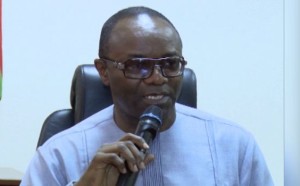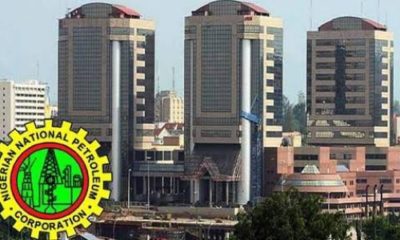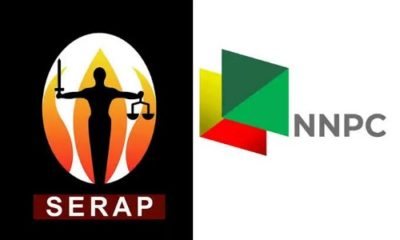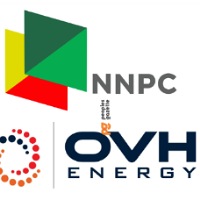Oil
NNPC Requires $500m to fix the country’s refineries- Kachikwu
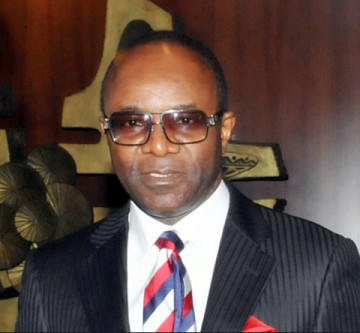
…plans to increase the nation’
s crude production to 3M bpd by 2016
By Yemie ADEOYE
LAGOS– THE Nigerian National Petroleum Corporation (NNPC) has announced that the sum of 500 million united states dollars would be required to fix the country’s three refineries which are currently in a state of comatose.
Group Managing Director of the NNPC Dr. Ibe Kachikwu disclosed this at a Luncheon organised in his honour by the Petroleum Club in Lagos. He said that the refineries model cannot be sustained to achieve the desired production capacity.
The NNPC boss said the proposed money which will be repaid over a period of eight years is specifically to repair the refineries.
He revealed that he had been inundated with requests for allocation of Low Pour Fuel Oil (LPFO) and other products from the refineries but insisted that the time of allocation of products to people by the NNPC is over
Kachikwu has stated that his target is to ensure that Nigeria’s crude oil production capacity hits 3 million barrels per day by the end of 2016, from the current production level of about 2.5 million barrels per day.
He further stated that the preliminary results of seismic studies conducted in Chad Basin showed that there are potentials for oil discovery in the area, adding that he is optimistic that the announcement to that effect may be made by the end of this year.
“People come to my office to ask for allocation of LPFO but I tell them that the period of product allocation is over. That is clearly not my job.
“Nigerians must begin to add value to get results and income. My period, no matter how short, will not be characterised by favouritism.
“I like people to get rich but people should get rich based on ideas they bring to the table and not based on allocation paper given to them by government,” he said.
Kachikwu stated that there would be no space for armchair and brief-case businessmen in the present NNPC.
He stated that his target is to ensure that the country produces 3 million barrels per day by 2016.
According to him, the Nigerian Petroleum Development Company (NPDC), the upstream arm of the NNPC has increased its crude oil production capacity by 20,000 barrels per day since he took over 11 weeks ago as the Group Managing Director of the state-run oil firm.
Kachikwu stated that NPDC currently produces 220,000 barrels per day, which is expected to increase to 240,000 barrels per day by the end of this year.
According to him, his target is that by the end of 2016, NPDC will hit a production capacity of 350,000 barrels per day.
Kachikwu noted that NNPC will cut internal costs by 30 per cent by end of 2016 and also encourage the international oil companies (IOCs) to cut internal cost by 30 per cent, stressing that “2016 is my make or mar year.
He said the the Port Harcourt refinery has been shut down currently, bringing the combined output from 1.9 per cent in the last few weeks to zero output.
The NNPC had stated in its latest monthly report for September that: “Only Port Harcourt refinery produced 31,008million metric tonnes of petroleum products out of 35,648 MT (261,371.14 barrels) of crude processed at an average capacity utilization of 5.77 per cent.
Kachikwu, who described the poor refining capacity as worrying said there were plans to restore the lost glory of the refineries and ensure that they contribute massively to the national fuel consumption.
He said the corporation is speeding up the payment of the subsidy claims, adding that plans are also in the pipeline to review the subsidy system and bring down the amount of subsidy from about N20 per litre to about N5 per litre.
According to him, “products distribution is key to NNPC, and we have therefore sent out about 5000 trucks to various locations across the country in the last two days.”
Kachikwu however restated his commitment to turn around the NNPC to a world-class company within the next six to 12 months and ensure that it works efficiently in a transparent and accountable manner.
“We are out for transparency. We will be engaging the presidency of weekly basis, the governors monthly, and the National Assembly on monthly basis, while we continue to publish out reports monthly,” he said.
The NNPC boss, who agreed that these are very serious trying times for the industry, said the problems are actually more serious than we think, so Nigerians need to work hard and begin to add value.
He said the president is deeply worried about the prevailing situation in the industry and has gave him the mandate to fix the problems, “and I will never do things that will compromise my integrity,” he stated.
Kachikwu said his administration has recovered $420million from the legacy crude swap contract, increases gas supply to power plants to about 231 million standard cubic feet per day (mbpd) and planned to hit 240 mbpd next year.
“In 12 weeks at the NNPC, I have enhanced commercial value, increase productivity, increase profitability and improved governance at the corporation,” he stated.
On the much-delayed Petroleum Industry Bill (PIB), Kachikwu said the bill could not be passed in its current form, rather he will move to deal with the fiscal issues and move forward while other areas are sorted out.
He warned the briefcase businessmen to be careful, while the joint venture partners should come with clean hands in terms of project costing.
“Within 12 to 24 months, we want to build a competitive and stable investment regime that balances the needs of the nation and private investors.
” We will have zero tolerance for undue hike of project costs.
“The Joint Venture partners should go back to the table grill your numbers and be sure before you come to me,” he said.
Oil
NNPC Discovers Over 4,800 Illegal Pipeline Connections

The Nigerian National Petroleum Company (NNPC) Limited has revealed the detection of more than 4,800 unauthorized connections on oil pipelines within the country, painting a troubling image of the nation’s primary source of revenue.
Mele Kyari, the Group Chief Executive Officer of NNPC Ltd, communicated this information to the Senate Committee on Appropriations last Friday.
He said, “We have over 4,800 illegal connections on our pipelines. That means in some lines, within 100 kilometres of pipelines, you have as much as 300 insertions.
“Therefore, even when you produce the oil, you cannot deliver them at the required pressure and therefore the volume will also be less.”
As per the NNPC Ltd chief, individuals from various regions enter the Niger Delta, inserting unauthorized connections on pipelines in Nigeria’s oil-producing area.
This recent revelation follows a prior discovery of 295 illegal connections to the pipelines by the firm a year ago, underscoring the escalating issue of crude oil theft in Nigeria.
Two years earlier, Kyari had highlighted the country’s daily loss of 200,000 barrels of oil, amounting to $13 million due to theft and vandalism.
He further stated “We have two sets of losses, one coming from our products and the other coming from crude oil. In terms of crude losses, it is still going on. On the average, we are losing 200,000 barrels of crude every day.”
After the discovery, Nigeria’s security forces pledged to enhance security around the country’s pipelines.
To bolster this, the Federal Government granted a multi-billion naira pipelines surveillance contract to Tantita Security Services, headed by former militant leader Government Ekpemepulo, also known as Tompolo.
Despite facing criticism for this decision, Senator Heineken Lokpobiri, the Minister of State for Petroleum, remains convinced that it was the appropriate course of action.
In August, following a tour of oil facilities in the Niger Delta, Senator Heineken Lokpobiri expressed gratitude to Tantita, commissioned by NNPC Ltd, for their ongoing work.
He also hinted at plans for further extensive endeavors in the future.
In 2021, after extensive debate and delays, the Petroleum Industry Bill was finally passed to attract increased foreign investment into the oil sector through amendments to regulations, royalties, and taxes.
Oil
Dangote Refinery Set To Begin Fuel Production With First Crude Arrival

Nigeria’s colossal $19 billion Dangote Refinery, after encountering several setbacks, is on the verge of kickstarting fuel production.
This achievement is heralded by the arrival of the first crude shipment, transported by the OTIS tanker carrying 950,000 barrels of Nigeria’s Agbami crude.
S&P Global, citing industry sources and tanker tracking data on spglobal.com, reported the tanker’s departure on December 6, en route to Lekki, the nearest land port to Dangote’s offshore crude receiving terminal.
Scheduled to reach its destination around 8 PM on December 7, the arrival of this shipment signifies the commencement of crude supplies for the refinery’s operations.
Chartered by the state-owned Nigerian National Petroleum Company (NNPC), the Suezmax tanker is an emblem of the initial crude supply to Dangote’s cutting-edge refinery, as disclosed by a West African oil trader familiar with the matter in the S&P report.
Even though the refinery was officially completed in May, the absence of domestic crude feedstock had hindered oil product manufacturing.
To address this, the NNPC, holding a 20% stake in the refinery, struck an agreement to provide 6 million barrels of crude oil as feedstock to the Dangote refinery in December.
This move aims to jumpstart operations and overcome the previous impediments.
Agbami, operated by Chevron, holds a prominent position among Nigeria’s major deepwater developments, producing around 100,000 barrels per day in the central Niger Delta.
Known for its light sweet crude qualities, with a specific gravity of 47.9 API and a low sulfur content of 0.04%, Agbami produces substantial amounts of naphtha and kerosene.
NNPC has chartered additional shipments from different Nigerian offshore fields to the refinery, marking the start of a sequence of planned crude supplies for the month, as mentioned by the oil trader.
Located on the outskirts of Lagos, Nigeria’s commercial hub, the Dangote Refinery encountered repeated delays since its 2013 announcement, despite significant installation progress in 2019.
The refinery, designed to handle multiple crudes simultaneously, targets three Nigerian crude grades—Escravos, Bonny Light, and Forcados. When operating at full capacity, it aims to produce 327,000 barrels per day (b/d) of gasoline, 244,000 b/d of gasoil/diesel, 56,000 b/d of jet fuel/kerosene, and 290,000 metric tons per year of propane/LPG.
Dangote’s operations starting signify Nigeria’s hopes to lessen its reliance on gasoline imports, addressing the deficiencies of its existing refineries undergoing repairs. This shift is poised to reshape Nigeria’s oil industry, potentially leading to gasoline self-sufficiency by the 2040s.
Dangote officials anticipate an initial output of 370,000 barrels per day (b/d), emphasizing jet fuel and diesel production.
Industry analysts, however, project the refinery to reach its full operational capacity by mid-2025, although potential delays remain a looming concern.
Oil
NNPCL Sets Dec 2024 Terminal Date For Fuel Importation

The Nigerian National Petroleum Company Limited (NNPCL) has announced intentions to cease importing refined petroleum products by December 2024, anticipating full operational functionality for all national refineries by that time.
Group CEO, NNPC Ltd, Mele Kyari, shared this at a meeting with Speaker Tajudeen Abbas of the House of Representatives, who advocated for the privatisation of Nigeria’s refineries on Thursday.
Projections indicated the national oil firm’s revenue could climb to N4.5 trillion by the conclusion of 2023. Moreover, the rehabilitation of the Port Harcourt Refining Company, managed by NNPCL, was slated for completion by December of the current year.
Meanwhile, Oil marketers verified on Thursday that the Port Harcourt refinery is set for operations, potentially starting in January 2024. They emphasized that once operational, this refinery could notably reduce the prices of refined petroleum products.
During the meeting in Abuja, Kyari asserted Nigeria’s intention to cease importing refined petroleum products by 2024, envisioning the country’s emergence as a net exporter of these commodities within the same year.
He outlined the plans for launching operations at the Port Harcourt, Warri, and Kaduna refineries.
Kyari reiterated that all refineries would operate at full capacity, ultimately paving the way for Nigeria to transition into a net exporter of petroleum products by the conclusion of 2024.
He attributed the inactivity of Nigeria’s refineries over the years to the petroleum subsidy, emphasizing that the removal of this subsidy was drawing significant private-sector investments into the sector.
Kyari said “I can confirm to you that by the end of December this year, we will start the Port Harcourt refinery; early in the first quarter of 2024, we will start the Warri refinery and by the end of 2024, Kaduna refinery will come into operation.
“This is the commitment we are giving today and you can hold us accountable for this. In 2024, many of the initiatives including the rehabilitation of our refineries and also the efforts of small-scale refineries, and the upcoming Dangote refinery, will make Nigeria a net exporter of petroleum products in 2024.
“We will no longer be talking about fuel importation by the end of 2024. I am very optimistic that this will crystallise.
Kyari promised that by the conclusion of 2023, the government’s anticipated revenue from the company would reach N4.5 trillion, emphasizing NNPCL’s adherence to the Petroleum Industry Act and its commitment to delivering value to shareholders.
Recall that in October 2023, it was reported that Nigeria’s monthly spending on the importation of Premium Motor Spirit, known as petrol, had reached approximately N843 billion due to NNPCL’s cessation of oil swaps.
In July of this year, the Nigerian Midstream and Downstream Petroleum Regulatory Authority reported that during the post-deregulation period, spanning June 1 to June 28, 2023, the country’s total petrol consumption amounted to 1.36 billion litres, with an average daily consumption of 48.43 million litres.
The average ex-depot price of petrol, sourced solely from NNPCL as the importer, stands at about N580 per litre.
However, both NNPCL and oil marketers declared on Thursday that this substantial oil import expenditure would soon diminish.
They anticipated a drop once the Port Harcourt refinery commences production of refined petroleum products from January 2024, barring any unforeseen circumstances.

